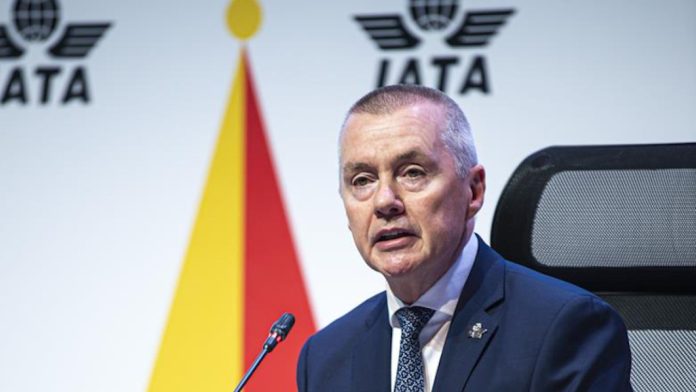Willie Walsh, IATA’s director general. Image: IATA
In 2024, SAF production volumes reached 1 million tonnes (1.3 billion liters), double the 0.5 million tonnes (600 million liters) produced in 2023. SAF accounted for 0.3% of global jet fuel production and 11% of global renewable fuel.
This is significantly below previous estimates that projected SAF production in 2024 at 1.5 million tonnes (1.9 billion liters), as key SAF production facilities in the US have pushed back their production ramp up to the first half of 2025.
In 2025, SAF production is expected to reach 2.1 million tonnes (2.7 billion liters) or 0.7% of total jet fuel production and 13% of global renewable fuel capacity.
“SAF volumes are increasing, but disappointingly slowly. Governments are sending mixed signals to oil companies which continue to receive subsidies for their exploration and production of fossil oil and gas. And investors in new generation fuel producers seem to be waiting for guarantees of easy money before going full throttle. With airlines, the core of the value chain, earning just a 3.6% net margin, profitability expectations for SAF investors need to be slow and steady, not fast and furious. But make no mistake that airlines are eager to buy SAF and there is money to be made by investors and companies who see the long-term future of decarbonisation. Governments can accelerate progress by winding down fossil fuel production subsidies and replacing them with strategic production incentives and clear policies supporting a future built on renewable energies, including SAF,” said Willie Walsh, IATA’s director general.
“The airline industry’s decarbonisation must be seen as part of the global energy transition, not compartmentalised as a transport issue. That’s because solving the energy transition challenge for aviation will also benefit the wider economy, as renewable fuel refineries will produce a broad range of fuels used by other industries, and only a minor share will be SAF, used by airlines. We need the whole world to produce as much renewable energy as possible for everybody. Airlines simply want to access their fair share of that output,” added Marie Owens Thomsen, IATA’s senior vice president sustainability and chief economist.
To reach net zero CO2 emissions by 2050, IATA analysis shows that between 3,000 to over 6,500 new renewable fuel plants will be needed. These will also produce renewable diesel and other fuels for other industries. The annual average capex needed to build the new facilities over the 30-year period is about $128 billion per year, in a best-case scenario. Importantly, this amount is significantly less than the estimated total sum of investments in the solar and wind energy markets at $280 billion per annum between 2004 and 2022.
“Governments must quickly deliver concrete policy incentives to rapidly accelerate renewable energy production. There is already a model to follow with the transition to wind and solar power. The good news is that the energy transition, which includes SAF, will need less than half the annual investments that realising wind and solar production at scale required. And a good portion of the needed funding could be realised by redirecting a portion of the retrograde subsidies that governments give to the fossil fuel industry,” said Walsh.



